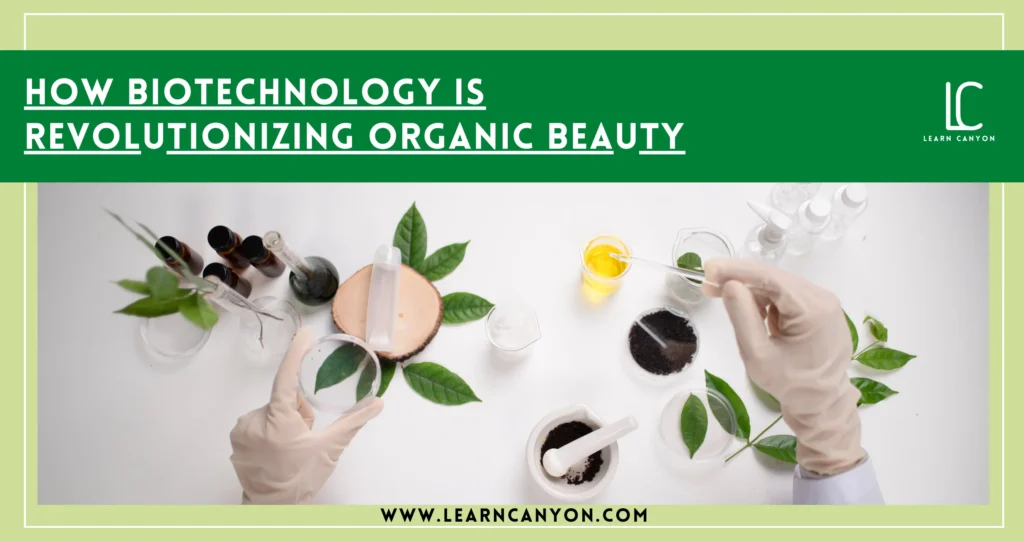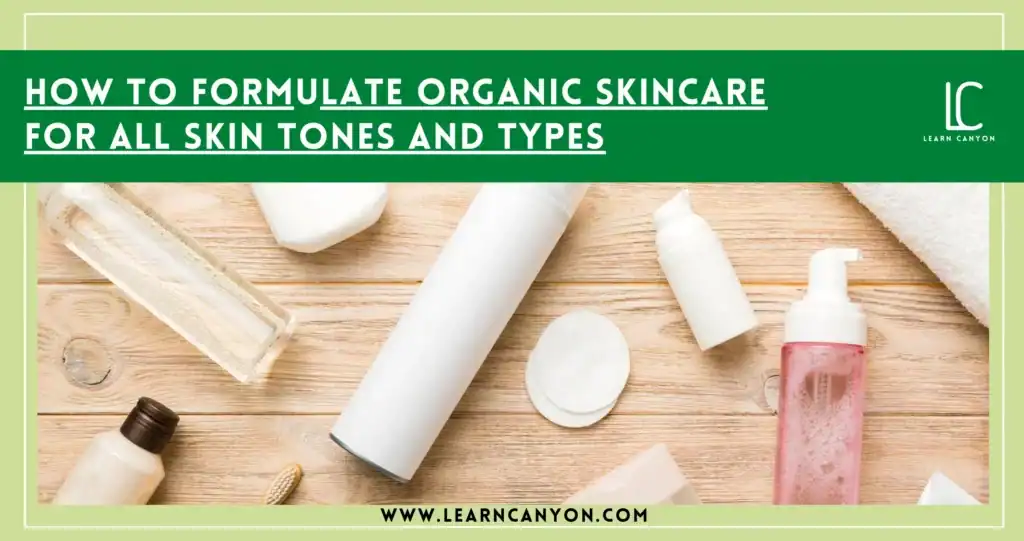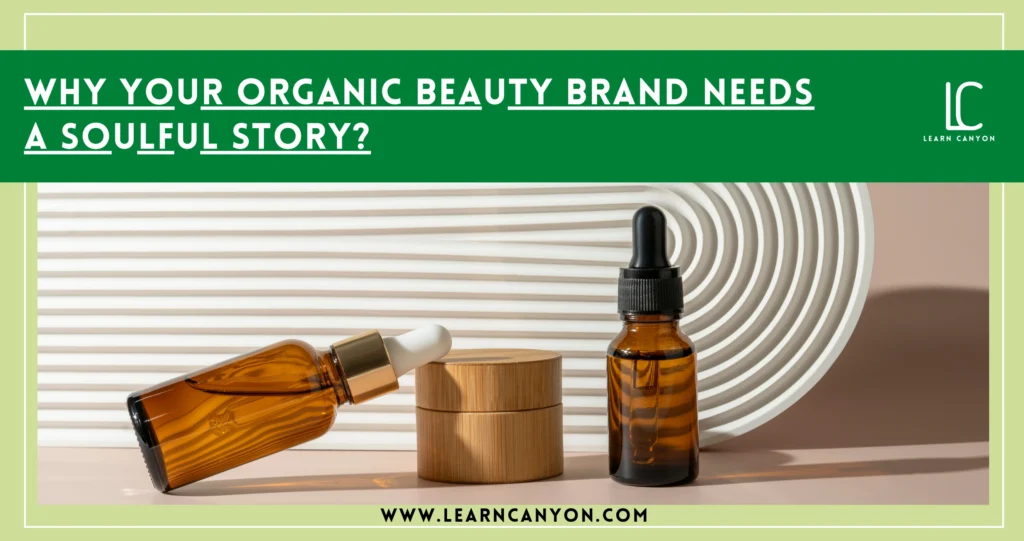Let’s take a moment to reimagine what “organic beauty” truly means today.
When most people hear the term, their minds instantly drift to lush botanical gardens, cold-pressed oils, and herbal infusions. And while that’s absolutely part of the charm, organic beauty is evolving, quietly, smartly, and sustainably, thanks to the power of biotechnology.
Now, before you raise an eyebrow at the word “biotech,” let me assure you: this isn’t about synthetic shortcuts or lab-grown chemicals trying to mimic nature.
As a professional formulator who’s deeply rooted in herbal and organic traditions, I’ve grown to appreciate how biotechnology can complement what nature has already perfected. It’s not here to replace nature, it’s here to respect, preserve, and elevate it.
In this blog, I’ll walk you through how biotechnology is not only aligned with organic beauty but is also revolutionizing how we create high-performing, skin-loving products that are kinder to both our bodies and the planet.
Ready to explore the science behind nature’s next chapter? Let’s dive in.
What Is Biotechnology in Beauty?
Alright, let’s break it down, because the term biotechnology can sound a bit… clinical, right? But trust me, it’s far more fascinating (and gentle) than it sounds.
In the world of beauty, biotechnology simply means using living organisms, like bacteria, yeast, or plant cells, to create powerful, high-performing ingredients. Think of it as guided nature. We’re not reinventing the wheel; we’re giving nature a cleaner, more sustainable lab to do its magic.
For example, instead of harvesting rare plants from the wild, damaging ecosystems in the process, we can now grow those same active compounds in controlled environments using plant stem cells or fermentation. The result? Purity, potency, and consistency, batch after batch.
You might already be using biotech ingredients without realizing it. Ever come across fermented green tea, hyaluronic acid, or plant-based squalane? Yep, all brought to life through biotechnology.
And here’s the best part: biotech ingredients can be every bit as natural and organic as their traditional counterparts, as long as the processes and sources align with organic certification standards.
As a formulator who’s deeply committed to clean, plant-powered beauty, I see biotechnology as a bridge, connecting the wisdom of ancient botanicals with the precision and sustainability of modern science. It’s how we keep our formulas green, effective, and future-ready.
Why Biotechnology Matters in Organic Beauty
Let’s get real for a moment, because being in the organic beauty space isn’t just about creating beautiful products. It’s also about being responsible formulators who care deeply about people, the planet, and long-term sustainability.
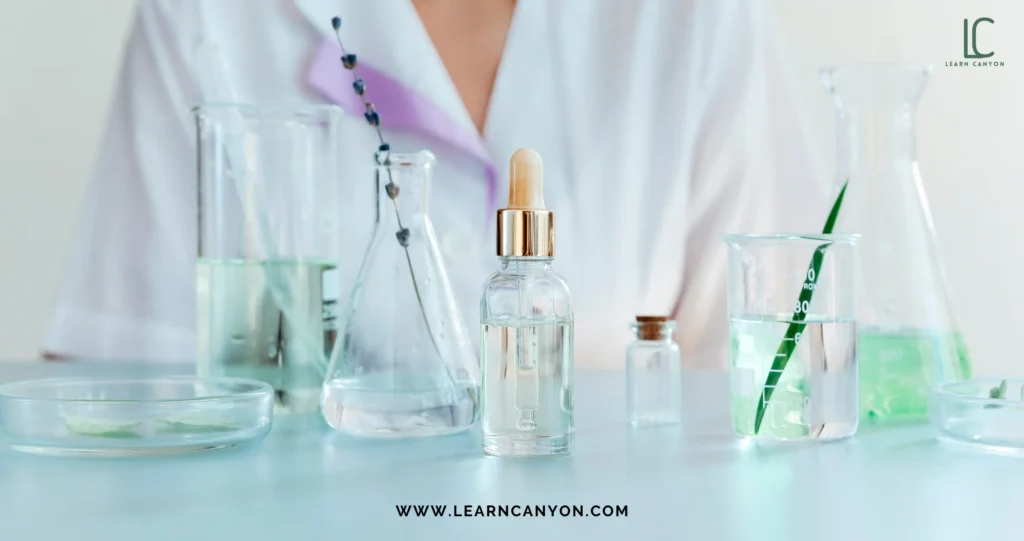
Here’s where biotechnology truly shines.
One of the biggest challenges in organic skincare is ingredient sourcing. Some plants are seasonal, others are endangered, and harvesting them at scale can lead to deforestation, soil degradation, and loss of biodiversity. As someone who believes in honoring nature, that’s a line I just don’t want to cross.
Biotechnology offers a solution.
By growing ingredients in labs, using safe, eco-friendly methods, we can protect rare botanicals, reduce the strain on natural resources, and even cut down on water and land usage. It’s an incredible way to support our planet while still delivering exceptional skin benefits.
And here’s another thing: biotech ingredients are remarkably consistent. When we rely solely on wild-harvested or farmed botanicals, quality can vary depending on climate, soil, and harvest timing. But with biotech? We can ensure high purity and performance, without compromising on safety or integrity.
It’s also a game-changer for conscious brands and conscious customers. People today want skincare that works, feels amazing, and reflects their values. Biotechnology helps us check all those boxes.
So yes, biotech matters. Not because it’s trendy, but because it gives us a smarter, cleaner, and more ethical way to do what we love most: create transformative, organic beauty products that truly make a difference.
Key Biotech Ingredients Making Waves
Now that we’ve unpacked the why, let’s talk about the what. As a formulator, I get so excited when I see biotech ingredients that not only work beautifully but also align with organic, sustainable values. Honestly, it feels like skincare alchemy, nature meets innovation in the best way possible.
Here are some standout biotech ingredients that are changing the game in organic beauty:
Fermented Actives
You’ve probably seen fermented rice water, fermented green tea, or even fermented ginseng popping up in skincare. Fermentation helps break down ingredients into smaller molecules, making them more bioavailable and skin-friendly. Plus, it boosts antioxidant levels naturally, what’s not to love?
Plant-Based Squalane
Traditional squalane used to come from shark liver oil (yikes!), but thanks to biotech, we can now derive it from sugarcane through a clean, fermentation-based process. It’s lightweight, non-greasy, and an absolute dream for hydration, plus, it’s 100% vegan and planet-approved.
Ectoin
This one’s a bit of a hidden gem. Ectoin is produced by microorganisms that live in extreme environments like salt lakes and deserts. Through biotech, we can harness its incredible protective properties, it’s amazing for sensitive skin, anti-pollution defense, and deep hydration. Think of it as a gentle skin shield.
Bakuchiol (Enhanced)
We already love bakuchiol as the plant-based retinol alternative, but biotech helps amplify its purity and stability. The result? A more consistent, potent active that’s still gentle enough for daily use, even for sensitive skin or during pregnancy.
Biosurfactants
This is one of my favorites to use in cleansers. These are gentle, biodegradable surfactants derived through fermentation, often using glucose or plant oils. Unlike harsh sulfates, biosurfactants cleanse without stripping the skin’s natural oils or disturbing the microbiome.
These ingredients aren’t just “nice to have”, they’re proof that biotech can give us better versions of nature, with less environmental impact and more consistent performance.
As formulators, we no longer have to choose between effectiveness and ethics. With biotech, we get to say yes to both.
How Biotech Supports Organic Standards
Let’s clear the air on something I hear all the time:
“Priya, if it’s made in a lab… how can it be organic?”
I get it.
The word “biotechnology” sounds like it belongs in a pharmaceutical lab, not in your rose-infused serum or your aloe vera face mist. But here’s the truth: biotech and organic can absolutely go hand-in-hand, when it’s done right.
Biotech ingredients used in organic formulations are often derived from natural, renewable sources, like sugarcane, coconut, or plant cells. These ingredients are grown and processed without synthetic chemicals, just like you’d expect in traditional organic beauty. The difference is, biotech uses controlled fermentation, enzymatic processes, or plant stem cell cultures to create ingredients that are purer, more consistent, and often more sustainable than traditional farming allows.
Many of these ingredients are even approved by COSMOS, Ecocert, and other leading organic certifying bodies. The key is transparency and traceability, two things biotech does beautifully.
Let me give you an example. Traditional harvesting of rare botanicals can harm biodiversity. But with plant stem cell culture (a form of biotech), we can grow the same active compounds without uprooting a single wild plant. That’s not only ethical, it’s the future of conscious beauty.
As a formulator, I’m always evaluating ingredients not just for what they are, but for how they’re made. And I can confidently say: biotech supports the values at the heart of organic beauty, purity, sustainability, and respect for nature.
So the next time you see a biotech-derived ingredient in a clean beauty product, don’t be quick to dismiss it. Chances are, it’s doing a whole lot of good, for your skin and the Earth.
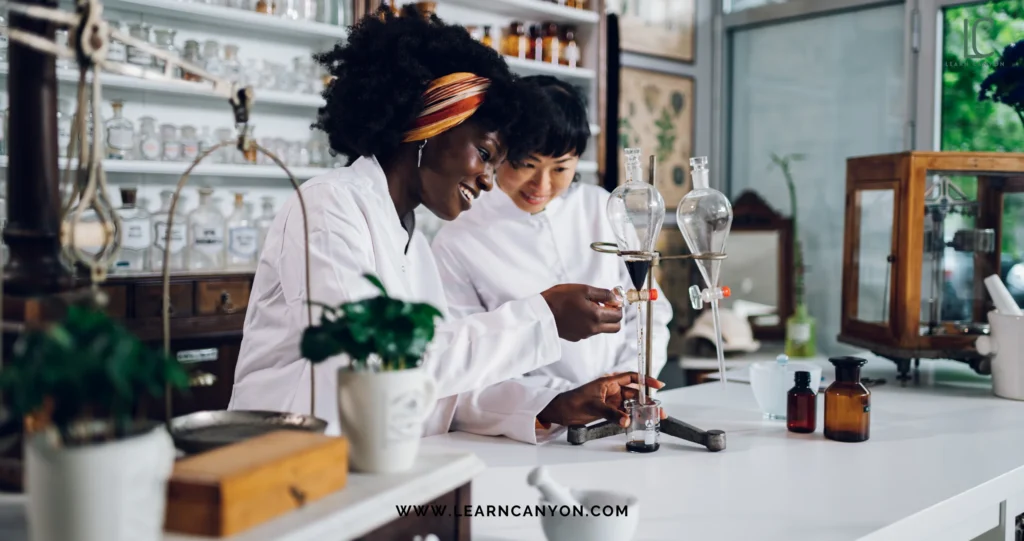
Innovation in Formulation and Product Performance
Now here’s where things get really exciting, from a formulator’s lens, biotech isn’t just about making ingredients more sustainable… it’s about unlocking a whole new level of performance.
Let me explain.
We’ve all worked with plant-based ingredients that are beautiful but temperamental, right? Maybe the scent varies from batch to batch, the color changes over time, or the active compound isn’t strong enough to deliver noticeable results. That’s where biotech steps in, and works its magic.
With biotech-derived actives, we get consistency, stability, and potency every single time. No more guessing whether the ingredient will behave in your formulation. This means products that last longer, feel better, and work more effectively, which our customers absolutely love.
And that’s just the beginning.
Biotech allows us to create ingredients that are tailored for the skin, like peptides that stimulate collagen, enzymes that gently exfoliate without irritation, and encapsulated molecules that deliver actives exactly where they’re needed.
Imagine a serum where each drop contains encapsulated bakuchiol and niacinamide released gradually throughout the day, thanks to a smart delivery system made possible by biotech.
Or a probiotic-rich cream with fermented oat or rice that naturally supports the skin microbiome, keeping it calm, balanced, and healthy.
These kinds of innovations simply weren’t possible a decade ago in the organic space. But today, biotech is helping us push the boundaries of what clean, green beauty can do, without compromising on our core values.
As a formulator, I see it as this perfect blend: the soul of nature, powered by the precision of science. And honestly? That’s where the magic of modern organic beauty truly lies.
Challenges & Ethical Considerations
Now, while I’m a big advocate for the role biotechnology plays in organic beauty, I’ll be the first to say, it’s not without its challenges. And as professional formulators, it’s important we talk about them openly.
Let’s start with the obvious one: consumer perception.
Many people still hear the word “biotech” and immediately think “synthetic” or “unnatural.” And honestly, I don’t blame them. The clean beauty movement has trained us to be cautious of anything that sounds too scientific. But here’s the thing, we need to help reframe that conversation. Because biotech isn’t about synthetic shortcuts; it’s about sustainable innovation. The more we educate and stay transparent, the more trust we can build.
Another key challenge is labeling clarity. In some regions, biotech ingredients might fall into gray areas, where they’re derived naturally but processed in a lab, which can confuse both formulators and consumers when it comes to certifications or marketing claims. That’s why I always recommend working closely with certifying bodies (like COSMOS or Ecocert) and suppliers who are 100% transparent about their sourcing and processes.
Then there’s the ethical layer.
Not all biotech is created equal. Some companies might use genetically modified microorganisms (GMOs) or create ingredients using animal-derived enzymes, which could be a red flag if you’re formulating vegan or strictly organic products. This is where doing our homework becomes essential. I personally vet every supplier, ask the hard questions, and make sure their values align with mine.
And finally, let’s talk cost. Yes, biotech ingredients can be more expensive, especially the high-performance actives. But in my experience, they often replace the need for multiple less-effective ingredients, and the results? Far superior. So while the initial investment might be higher, the payoff in terms of product quality, brand trust, and long-term sustainability is absolutely worth it.
At the end of the day, biotechnology isn’t a magic fix. It’s a powerful tool, and like any tool, it’s all about how we choose to use it. For me, it’s about finding that sweet spot between integrity, performance, and purpose.
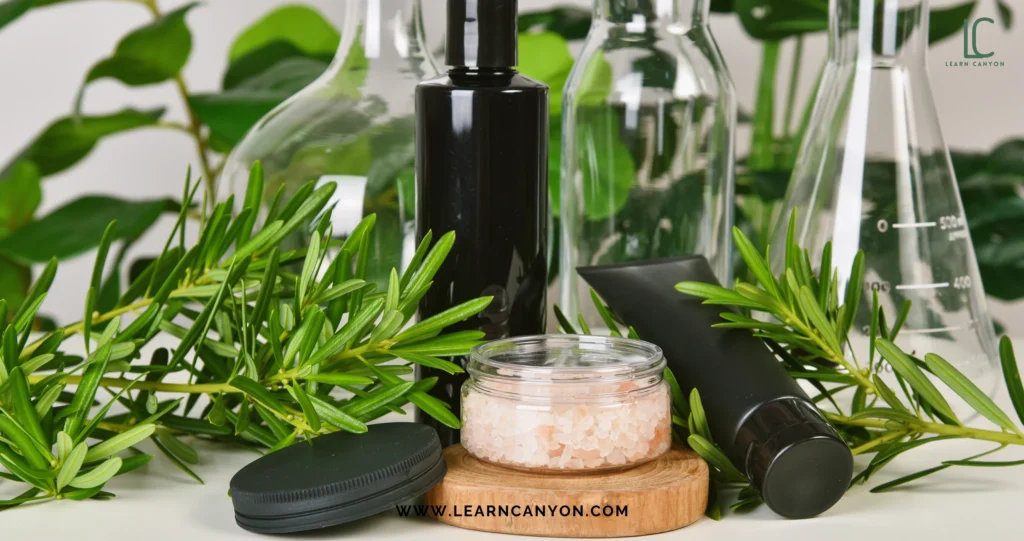
The Future of Biotech in Organic Beauty
If you ask me where organic beauty is headed, I’ll say this with all my heart: the future is science-backed, sustainability-driven, and soulfully natural, and biotechnology is right at the center of it all.
We’re just beginning to scratch the surface of what’s possible.
Imagine skincare that’s fully personalized, where your skin’s microbiome is mapped, and your serum is freshly made with biotech ingredients tailored to your needs. Sounds futuristic? It’s already happening in early stages.
Or think about lab-grown botanicals, where rare, endangered plants like edelweiss or blue lotus don’t have to be plucked from the wild. Instead, they’re cultivated through plant stem cell cultures in controlled environments, no harm to nature, but all the potent benefits for your skin.
And here’s something I’m personally excited about: AI-meets-biotech. With the help of smart tech, formulators like us can now design more precise, effective, and stable products, powered by high-performance, biotech-derived actives that are truly clean and green. It’s formulation, elevated.
We’re also seeing biotech lead the charge in packaging innovations, think biodegradable biofilms, or ingredient-activated preservation systems that reduce the need for synthetic preservatives.
But through it all, here’s what I believe will remain unchanged: the heart of organic beauty will still be about connection to nature, authenticity, and conscious formulation.
Biotech isn’t here to take away the soul of organic beauty, it’s here to protect it, preserve it, and give it a longer, stronger, more sustainable future.
And as a formulator who once started with kitchen botanicals and now formulates with the most advanced green tech available, I can tell you, the future looks absolutely beautiful.
Conclusion
As formulators, educators, and conscious creators, we’re standing at such an exciting crossroads, where tradition meets innovation, and nature meets science in the most harmonious way.
Biotechnology isn’t a threat to organic beauty. In fact, it’s one of the most powerful tools we have to honor and protect the purity we believe in. It gives us the ability to craft safer, more sustainable, and high-performance products, while staying rooted in our values.
Personally, I see biotech as an evolution, not a replacement. It’s a way to take the best of what nature offers and amplify it with care, intention, and precision. It allows us to dream bigger, formulate smarter, and serve our customers with products that are not just green and clean, but also effective and innovative.
So as we move forward in the world of organic beauty, let’s stay open, curious, and informed. Let’s keep exploring new ways to care for the skin, and the planet, with integrity.
Because when nature and science join hands, that’s when true beauty begins.




